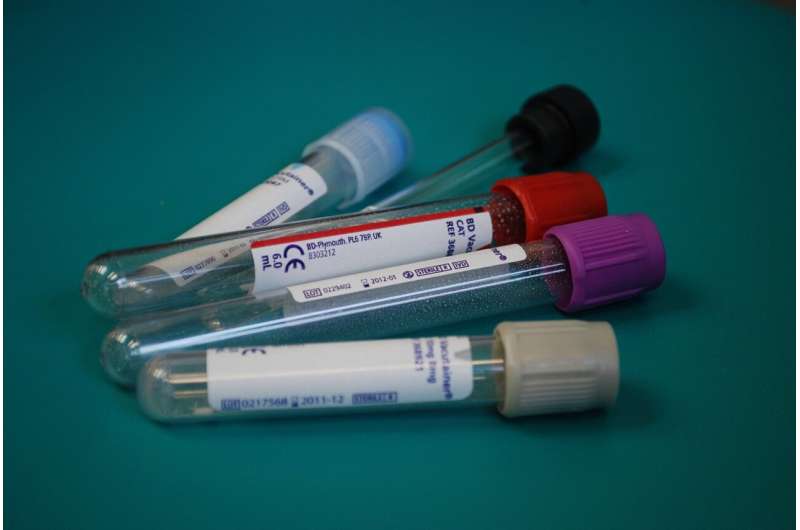Credit: Pixabay/CC0 Public Domain
A study examining the climate impact of low-value health care activity in Australia has found that unnecessary vitamin D tests generated carbon emissions equivalent to a car driving from Sydney to Perth 59 times.
The researchers say in 2020 unnecessary vitamin D tests in Australia cost the health care system more than $87 million (AUD) and had a carbon footprint of 28,000 to 42,000 kilograms of carbon dioxide equivalent emissions (kg CO2e).
The carbon footprint from vitamin D tests was calculated from the embedded emissions in the blood collection equipment such as needles, syringes and glass tubes. They have to be manufactured, distributed and disposed of, all of which generates carbon emissions.
Reducing unnecessary vitamin D tests could help lower the carbon footprint of health care in the country. The University of Sydney led study was published in BMJ Open.
Health care has a significant carbon footprint: in 36 major countries it is responsible for 4.4% of annual global CO2e emissions. In Australia, health care represents 7% of national CO2e emissions.
Low-value care represents about 30% of health care. It is defined as health services that have limited or no benefit to patients but carry risks or costs for patients and the health system.
"There are high rates of vitamin D testing of healthy individuals who are not at risk of vitamin D deficiency—with previous research estimating that 76.5% of vitamin D tests did not meet any of the Medicare indications for testing. We need to reduce low-value care such as over-testing and overtreatment," says lead author Matilde Breth-Petersen from the Wiser Healthcare collaboration, University of Sydney's School of Public Health.
"We must improve health care sustainability by decreasing wasted resources and the carbon footprint of health care. It deserves additional attention in policy, practice and future research."
The researchers examined the environmental, health, and financial impacts of unnecessary vitamin D testing, using data from Medicare records. There was a total of 4,457,657 Medicare-funded vitamin D tests in 2020, on average one test for every six Australians. This was an 11.8% increase from the mean 2018–2019 total.
Total vitamin D tests conducted in 2020 surpassed the total for previous years. This is despite a visible decline of tests initially during late March to mid-May 2020, that coincided with Australian public health orders in place in response to COVID-19.
"Analysis based on 2019 data followed the same pattern. This implies that using pre-pandemic data makes no difference to the overall picture," said senior author Professor Alexandra Barratt from the Wiser Healthcare collaboration, Faculty of Medicine and Health.
"This study shows vitamin D testing represents an opportunity to reduce the carbon footprint of health care."
Key findings
- An estimated 76.5% of Australia's vitamin D tests provide no net health benefit, meaning that there were 3,410,108 unnecessary tests in 2020.
- Total Medicare costs of unnecessary vitamin D tests amounted to more than $87 million (AUD) in 2020; in comparison, the total cost of all vitamin D tests was more than $114 million (AUD).
- The 2020 carbon footprint of unnecessary vitamin D tests was 28,576–42,012 kg CO2e, equivalent to driving ~160,000–230,000 km in a standard passenger car (driving from Sydney to Perth 40–59 times).
- Total vitamin D tests conducted in 2020 surpassed the total for previous years, and data for the first half of 2021 show a further increase in monthly testing numbers.
Carbon costs most likely an 'underestimate'
The researchers say the estimate of carbon emissions and costs from unnecessary vitamin D tests in Australia is most likely an underestimation. The analysis used Medicare records, which means tests not covered by Medicare were not included in their calculations.
"Internationally, up to 92% of vitamin D tests may be unnecessary. Our estimate of 76.5% being unnecessary in Australia is based on 2016 data, and we know that rates have continued to increase since then," said Ms. Breth-Petersen.
More information: Matilde Breth-Petersen et al, Health, financial and environmental impacts of unnecessary vitamin D testing: a triple bottom line assessment adapted for healthcare, BMJ Open (2022). DOI: 10.1136/bmjopen-2021-056997
Journal information: BMJ Open
Provided by University of Sydney
























